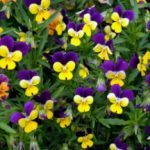 Bobbing in the breeze, miniature pansies begged, like baby robins. When I didn’t water them, their faces became question marks—two dozen questions without answers.
Bobbing in the breeze, miniature pansies begged, like baby robins. When I didn’t water them, their faces became question marks—two dozen questions without answers.
When I walked down the path, I thought of the answer Jesus may have given: “Or take the lilies; they do not spin, they do not weave; but I tell you, Solomon in all his splendor was not arrayed like any one of them . . . Stop worrying” (Lk. 12:27, 29).
Have you ever begged God for something, but never received it for a very long time, but then the request fell into your lap? Perhaps you thought, “Maybe I better duck when I ask in complete dependence upon God!” There is no need to worry.
O God, teach me trust. Help me learn the lesson that there is no need to worry. Let me be like the flowers which, without worry or care, grace the world in splendor.
The flower garden’s dainty carpeting of Sweet Woodruff had wandered a few inches to introduce itself to the grass. Hostas were performing acrobatic acts upon their slender stalks. The auricular seemed to form their own garden club with the Snow Lady calling the meeting to order. The poppy mallows reveled in the sun. Pink turtlehead laughed in the corner. The sun sank lower, darkness letting the weeds escape detection. It was now too late to start weeding. I had chosen the better part—delighting in the flowers.
As a liturgist/musician I participate in nearly every act of worship in the parish. This should make me holy, don’t you think? But it doesn’t seem to be working that way. The liturgy can easily wash over me without my participating in the reality.
Ron Rolheiser writes: “We participate in Jesus’ sacrifice when we, like him, let ourselves be broken down, when we, like him, become selfless. The Eucharist, as sacrifice, invites us to become like the kernels of wheat that make up the bread. . . broken down and crushed, so that we can become part of communal loaf. . . .”
Am I willing to become crushed wheat? Or is that just a heroic thought that flies away like the chaff at the slightest irritation or affront to my ego? But I can return the next day with the chaff and once again ask to become transformed, to become what I eat—the Body of Christ.
I’ve walked through gardens where the owners named every plant, and I’ve walked through woods with persons who could name the wildflowers and identify the trees. I’ve read books on flowers classified with phylum, genus, and species. The naming indicates an ownership that escapes those who can only point to plants and say, “I wonder what those are.”
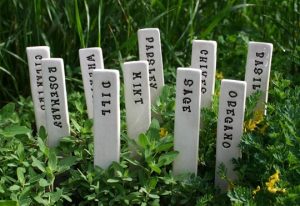 One difference between wildflowers and “tame” flowers is the name. Garden plots are dotted with empty seed packets impaled on sticks that let us know exactly what to expect, but there are no signs in the woods where it’s difficult to know a cinquefoil from a yellow-flowered wild strawberry.
One difference between wildflowers and “tame” flowers is the name. Garden plots are dotted with empty seed packets impaled on sticks that let us know exactly what to expect, but there are no signs in the woods where it’s difficult to know a cinquefoil from a yellow-flowered wild strawberry.
By naming us, God has “tamed” us. God has made us God’s own and has given us a mission. This mission corresponds to our personal God-giving name. Do you know God’s name for you? Do you know your mission? To find out, you might begin with these steps:
- Think of your favorite Scripture passages. Is there a common theme among them?
- Reflect on your unique talents and spiritual gifts.
- Who is Jesus for you? In other words, who is “my Jesus”?
- As you begin to decide upon your name and your personal mission, look back over your life to see whether the name and mission may fit you consistently.
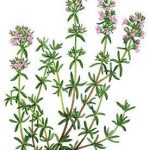 Tiny purple spears stood erect, their heads strained in one direction, as if intently listening. The Mother of Thyme had called a convocation. The sight reminded me of the Church, an assembly called into being on the cross and the primary place where we meet Christ. It is in the assembly that we know who Christ is.
Tiny purple spears stood erect, their heads strained in one direction, as if intently listening. The Mother of Thyme had called a convocation. The sight reminded me of the Church, an assembly called into being on the cross and the primary place where we meet Christ. It is in the assembly that we know who Christ is.
Where did you get your concept of God? Wasn’t it parents, teachers, friends, nature? And how do I reflect who God is? When I love others unconditionally, they have a better chance of knowing God’s unconditional life for them. When I sacrifice for a friend or relatives, that person understands a bit more of Christ’s sacrifice. When I share on a deep level, another sees more clearly how God in Christ is engaged with the world.
O God, as assembly, may we strain toward the completion of what we have been called to be: people upon whom the Spirit has been poured, people waiting for “the coming of that great and glorious day of the Lord.”
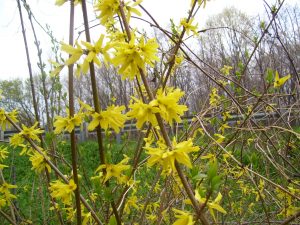 Having just finished flowering, the forsythia heard flattering remarks. A child said, “Mommy, look at the little yellow bells.” The botanist said, “This is a decorative genus of the olive family.” Passers-by remarked, “Look at the forsythia, a sure sign that spring is here!” But then the forsythia heard ominous words: “It’s time to prune.” In humility the forsythia bowed to the ordeal. Had the shrub refused, there would have not been flowers the following spring. Giving up its beauty, the forsythia preserved its future glory. Yielding to the pruning, the humble forsythia preserved its life.
Having just finished flowering, the forsythia heard flattering remarks. A child said, “Mommy, look at the little yellow bells.” The botanist said, “This is a decorative genus of the olive family.” Passers-by remarked, “Look at the forsythia, a sure sign that spring is here!” But then the forsythia heard ominous words: “It’s time to prune.” In humility the forsythia bowed to the ordeal. Had the shrub refused, there would have not been flowers the following spring. Giving up its beauty, the forsythia preserved its future glory. Yielding to the pruning, the humble forsythia preserved its life.
The paradox of losing life to save it is part of an incomprehensible divine logic. The seed breaks its cotyledons to sprout, fireweed flourishes after the land is burned, and clover is plowed under to enrich the soil. “Unless the grain of wheat falls to the earth and dies, it remains just a grain of wheat. But if it dies, it produces much fruit. The one who loves his life loses it, while the one who hates his life in this world preserves it to life eternal.”
Challenging God, prune me when you will.
 Overturning a rock reveals crawling grubs and squirming worms. Extremely important ecologically, these creatures enrich the soil and increase its porosity. They are part of a system in which sun, atmosphere, mineral fragments, chemical compounds, and living organisms interact. Unless we occasionally overturn a rock, we forget the life teeming below the surface.
Overturning a rock reveals crawling grubs and squirming worms. Extremely important ecologically, these creatures enrich the soil and increase its porosity. They are part of a system in which sun, atmosphere, mineral fragments, chemical compounds, and living organisms interact. Unless we occasionally overturn a rock, we forget the life teeming below the surface.
Overturning the “rocks” of our minds lets us see life. Removing the stones gives new perception to old ways of thinking, unchallenged views, unhealed memories, prejudice, or other mental blocks. Like the women going to the tomb, we need to ask, “Who will roll back the stone for us?”
Standing before the rolled back stone to the tomb, the women with spices were given access to something much greater than a sepulcher. The open entrance gave access to belief in resurrection: “He has been raised up; he is not here. See the place where they laid him.” The removed stone revealed life in its fullness-the resurrection life of the glorified Christ in which we now share.
God of Wonder, remove the stones that block life in us. And help us remove stones in others’ lives with our encouragement and support. With your divine life we can become our best selves—full of life.
Those who garden have a gift of accepting things as they are. They know certain plants cannot be planted beside others. They accept the need for acidic or alkaline soils. They know there’s “a time to plant, and a time to uproot the plant” (Eccles. 3:2).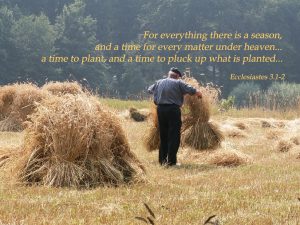
Accepting the ways of nature gives practice in accepting the ways of life. A parent ages, a spouse dies, a child is diagnosed with an incurable disease, violence comes to a quiet town. “This can’t be happening! Not to me, not to my family, not in my town!” we exclaim. When hardships occur, we can return to the garden, look around to all we have accepted as “the way things are” and ask the God of Creation for the grace of acceptance.
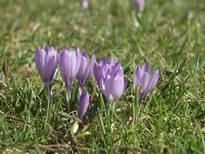 The green wheat fields give promise. Crocuses force their way through the topsoil. Tree buds approach the moment of explosion. Can you hear the groan of spring’s birthing?
The green wheat fields give promise. Crocuses force their way through the topsoil. Tree buds approach the moment of explosion. Can you hear the groan of spring’s birthing?
God has a plan: the mystery that began to be revealed in creation, reached its fullness in Christ, and strains toward eschatological fulfillment. The author of Colossians claims, “The mystery is Christ among you, your hope of glory” (Col. 1:27). Although the plan has been realized in Christ, it remains to be actualized in us. With creation we strain toward the glory, as we wait in hope.
Give a weed an inch, and it will take a “yard.” Consequently, weeding is vital, but not easy, for at times it’s difficult to distinguish between the desired plant and the weed. Pull both up, and the distinction, however, becomes obvious in their 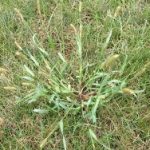 roots. (To paraphrase Scripture, by their roots you shall know them.) Weeds have only a main taproot, which lets them grow quickly. Flowers, trees, and vegetables, on the other hand, have a more complicated root system, that slows the growth, permitting more time for the plants to develop durability and beauty.
roots. (To paraphrase Scripture, by their roots you shall know them.) Weeds have only a main taproot, which lets them grow quickly. Flowers, trees, and vegetables, on the other hand, have a more complicated root system, that slows the growth, permitting more time for the plants to develop durability and beauty.
When we look back over the years, it may seem that our spiritual life grows slowly. Perhaps the slow growth may be God’s way of giving us sturdy rootedness in the divine.



